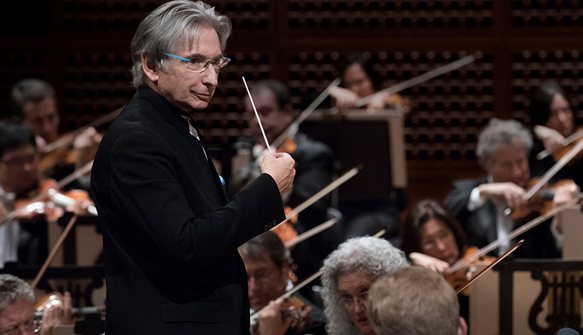
MUSCOVITES ARE BACK WITH GLOOM AND DOOM
The dearth of Russian opera in these parts has been addressed, not by the S.F. Opera but rather the S.F. Symphony. And it’s high time.
For the most candid view of Russian culture, tumultuous history and power-grabs, there’s no better place to start than Mussorgsky’s gloom-and-doom opera “Boris Godunov,” launched a century and a half ago. Despotic rulers, the poverty-stricken mobs of the oppressed, the focal role of religion, they all feed into this epic nationalist drama having no hero, only many men jostling for and lusting for power. And the drama there informs drama elsewhere, even now.
For the San Francisco Symphony to do an elaborate semi-staged version with costumes and projections (but no carried scores), it was a year-end budget-busting spectacle. It demanded 200 on stage, and close to an hour’s worth of overtime for the musicians. Even more important, prime Russian singer/actors were brought in, while various instruments like church bells were scattered around the hall where they might fit: 19th-century surround-sound, if you will! Music-director Michael Tilson Thomas’ annual year-end extravaganza was again highly effective theater, even if more than 10 percent of the audience had vanished by the final measures seeking happier venues, three hours after the start June 15.
There are at least four versions of “Boris” extant, two by Mussorgsky, none of them ideal. By choosing a blend of the 1869 and 1872 Mussorgsky versions, the SFS omitted the buoyant, colorful Poland party scene with Marina, the biggest female role. And it bypassed the later (and long preferred) Rimsky-Korsakov revisions with its far more voluptuous orchestration. The latter has scene orders flipped about, taking the final focus away from the Fool ironically bewailing Mother Russia and the fate of her people—the one honest voice emerging from mountains of fake news. The 1872 version had added the Kromy Forest scene and placed within it the Fool’s indispensable swan song.
The poignant hot-cold drama has a touching death scene for the usurper Boris, succeeded by the pretender Grigory passing himself off as the murdered heir Dimitri.
Sung in Russian by the huge cast (supplemented by English supertitles), interpretations were excellent, led by singer-actor Stanislav Trofimov, who dies seemingly from his profound sense of guilt over stepping on murder victims to become tsar. Unlike some famous predecessors like Chaliapin, Trofimov is a baritone, not bass, but his voice resonated richly through the hall and he made the death scene of this opportunist deeply moving. While the female roles are almost nonexistent, the production leaned on no less than nine solo basses and baritones, notable among them Maxim Kuzmin-Karavaev (Pimen the historian monk), Philip Skinner (Nikitich) and Vyacheslav Pochapsky (Varlaam). Also notable were tenors Yevgeny Akimov as the devious politician Shuisky and Sergei Skorokhodov as the pretender. The one misfire was the Fool not singing falsetto, seeming more sane than other Fool forerunners we’ve heard.
Few operas in history make so many demands of the chorus. The SFS Chorus discharged its duties admirably in Russian (as far as I could tell), but because of the high upstage placement behind a lot of scenery, much of the sound was suppressed.
The powerful mobile scenic and video design emphasized blood-red colors, consistent with the violent history of tsars. But overall, the somber side of the drama was accentuated, visually and musically, punctuated by vivid prisoner beatings and bindings downstage, inches from front-row patrons, up close and personal.
Music Director Michael Tilson Thomas brought out the highlights of this understated orchestral score, including the descending violin line symbolizing the tyrant’s final curtain coming down, and the vivid church-bell sounds introducing the Coronation Scene. (Not lost on chamber music devotees was the much older Coronation Chorus, which Beethoven had also quoted in his Rasoumovsky String Quartet, Op. 59 No. 2.)
The text, based in part on Pushkin, deals essentially with Boris who reigned as tsar in Russia, 1598-1605, in the “Time of Troubles.”
Performance time start-to-end ran three hours when given June 14-17 at Davies Symphony Hall, San Francisco.
“Boris Godunov” by Mussorgsky in semi-staged version with S.F. Symphony and Chorus, Davies Hall, S.F. For SFS info: (415) 864-6000. or go online.